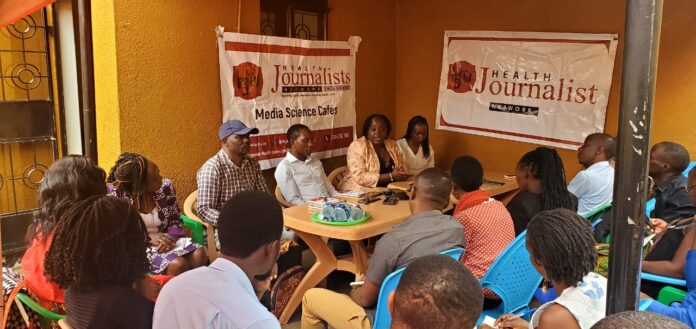Kampala – For millions living with HIV, daily antiretroviral therapy (ART) is a lifeline. But what if there was a cure? Ugandan researchers at Makerere University Walter Reed Project (MUWRP) are working tirelessly to make that a reality.
At a science cafe organized by the Health Journalists Network in Uganda (HEJNU) in Kampala on Tuesday, MUWRP’s Deputy Executive Director, Dr. Betty Mwesigwa, addressed the complexities of finding a cure.
“HIV is notorious for changing itself, evading the immune system, and hiding in body cells. These hidden cells, including brain cells, lymph nodes, liver, and spleen, harbor dormant HIV, making it difficult to target.” Dr. Mwesigwa explained
Despite these challenges, MUWRP is making progress through its participation in the HOPE (HIV Obstruction and Persistence Elimination) collaboratory, now in its fourth year. Funded by the National Institute of Health, HOPE aims to find a cure using the “block-lock-excise” approach.
“If we can lock the virus and prevent it from replicating, we’re also looking at gene therapy to excise it from the body,” Dr. Mwesigwa explained.
To enhance research capabilities, MUWRP is implementing the DELIVER (Development Leadership and Innovation in Viral Eradication Research) program. This initiative equips MUWRP’s laboratory with advanced machinery and trains scientists to conduct HIV cure research in-house.
The DELIVER program consists of laboratory and clinical components. The laboratory component equips MUWRP with advanced machinery and trains scientists for complex analyses. The clinical component enrolls participants, collects samples, and conducts analytical treatment interruption trials.
Dr. Mwesigwa noted that these trials assess whether new interventions can keep patients in remission without ART, ensuring participants’ safety with strict follow-up care.
“By participating in this research, Uganda ensures that developed products are effective for our population,” Dr. Mwesigwa emphasized.
Uganda established the Joint Clinical Research Center (JCRC) in 1991 with a mandate to find an HIV cure. Thirty-three years later, the cure remains elusive.
Dr. Henry Mugerwa, Director of Research at JCRC, explained why HIV is difficult to cure: “HIV integrates into your DNA, becoming part of you. It enters your blood, cells, and DNA, making it difficult to target without harming yourself.”
He said JCRC is now working with partners like MUWRP to overcome these challenges.
Speaking at the same cafe, Moses Nsubuga, also known as “Supercharger,” Executive Director of Joint Adherent Brothers and Sisters Against AIDS (JABASA), emphasized the importance of comprehensive patient care.
“Doctors treating people living with HIV should help them understand the medication they’re taking, its importance, and the potential risks of not using it correctly. This includes knowing the drugs they’re using and the dangers they face if they don’t use them correctly,” Nsubuga urged
The HIV/AIDS epidemic continues to affect Uganda, with approximately 52,000 new infections and 17,000 deaths occurring yearly, primarily among young females aged 15 to 24, according to recent statistics by Uganda AIDS Commission.
However with continued research and innovation, Uganda is moving closer to achieving its goal of finding an HIV cure. Ugandan researchers, in collaboration with global experts, are also exploring innovative approaches to HIV prevention.


